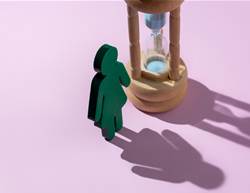Menopause is a natural phase of life, but it often comes with uncomfortable symptoms like hot flushes, night sweats, mood changes and vaginal dryness. But is it possible to delay menopause? New research suggests it might be—and that doing so could have benefits for overall health and longevity.
A study published in Nature conducted RNA sequencing on flash-frozen human ovarian tissue from four women aged 23 to 29 and four women aged 49 to 52. Researchers found that the ovaries could serve as a strong model for studying ageing and testing drugs that may extend human health—particularly for women around 50. “This atlas provides a valuable resource for understanding the cellular, molecular and genetic basis of human ovarian ageing,” the study concluded.
Researchers are also investigating the immunosuppressive drug rapamycin to see if it could slow ovarian ageing and delay menopause. In this study, women aged 35 to 45 were given either a weekly dose of rapamycin or a placebo. Early findings suggest the medication may slow ovarian ageing by 20% and extend fertility by up to five years. How? Rapamycin appears to slow the ovaries down, reducing the number of eggs released each month. However, this study is ongoing.
It’s important to note that this research is still in its early stages and scientists have a long way to go before menopause can be delayed. But the findings are promising.
Here’s what doctors want you to know about ovarian ageing and what slowing it down could mean for the future of menopause.
What happens to the body during menopause?
Menopause marks the time when women naturally stop having periods. It also signals a drop in oestrogen production, a hormone that regulates the menstrual cycle. The average age for menopause is 51.
Oestrogen plays a crucial role in protecting against heart attacks and stroke. When oestrogen levels decline, women lose this protective effect, increasing the risk of cardiovascular disease.
Bone health is also impacted. Women tend to lose bone more rapidly in the first four to eight years after menopause due to lower oestrogen levels, increasing the risk of osteoporosis.
What might slowing ovarian ageing do?
Research into slowing ovarian ageing is still ongoing, but experts agree it could have significant benefits for women’s overall health.
“Slowing ovarian ageing has profound implications for women’s health,” says study co-author Dr Zev Williams. “The ovaries are central to reproduction, but they also play a critical role in overall health, producing hormones that regulate numerous systems, including the heart, bones and brain.”
Extending ovarian function could improve quality of life, says ob-gyn Dr Jessica Shepherd. “If we could sustain ovarian function longer, we might improve quality of life, reduce health care costs and promote better longevity,” she says.
The ovaries age faster than other organs, yet they communicate with multiple systems in the body, says study co-author and professor Yousin Suh. “The ovaries really influence our overall health,” she says.
Slowing ovarian ageing may also extend fertility. “Fertility naturally declines as a woman’s ovarian reserve diminishes with age,” says Dr Williams. “Slowing this process could extend the window of natural fertility and improve outcomes for assisted reproductive technologies like IVF.”
This could be particularly meaningful as more women delay having children for personal, educational or professional reasons.
However, delaying menopause doesn’t necessarily mean prolonging fertility, says women's health researcher Piraye Yurttas Beim. “Extending ovarian function could theoretically add a few years of fertility, but egg cells age on their own timeline due to accumulated DNA damage,” she explains. “This is why women continue to have normal periods for years after they can no longer conceive with their own eggs.”
Still, Dr Williams emphasises that this research is about more than just fertility. “Our goal is to develop interventions that promote not just longer reproductive health, but also a longer healthspan,” he says.
Suh agrees. “Maybe as a side effect, you would have longer fertility,” she says. “But that’s totally out of focus—ovaries aren’t just for reproduction.”
How could this impact the future of menopause?
If ovarian ageing can be slowed, Dr Williams says it may “fundamentally change the experience and timing of menopause.”
“By delaying menopause, women could avoid or reduce the severity of symptoms like hot flushes, sleep disturbances and mood changes, while also lowering the risk of postmenopausal conditions like osteoporosis,” he explains. “This research opens the door to reimagining menopause—not as an inevitable decline, but as a phase that can be managed and perhaps delayed for better health outcomes.”
What happens next?
Dr Williams and his team are continuing their research into slowing ovarian ageing for both fertility and overall health. “We envision combining advances in molecular biology, genetics and regenerative medicine to further enhance ovarian health,” he says. “We’re committed to translating these breakthroughs into clinical practice, ensuring that women have access to cutting-edge care that improves their lives in meaningful ways.”




.jpg&h=90&w=90&c=1&s=1)


.png&h=193&w=250&c=1&s=1)
